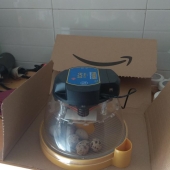
 7
7




 8
8




"When the whole world is running towards a cliff, he who is running in the opposite direction appears to have lost his mind." C.S. Lewis
Visit https://themaineingredient.com for organic, premium dried culinary herbs that are grown, processed, and packaged in the USA.
 8
8




 8
8




 9
9




Visit Redhawk's soil series: https://permies.com/wiki/redhawk-soil
How permies.com works: https://permies.com/wiki/34193/permies-works-links-threads
 5
5




 6
6




Flora Eerschay wrote:... The downside is that it might be a bait for predators.
Visit Redhawk's soil series: https://permies.com/wiki/redhawk-soil
How permies.com works: https://permies.com/wiki/34193/permies-works-links-threads
 11
11




![Filename: klateczka.png
Description: [Thumbnail for klateczka.png]](/t/359554/a/274392/klateczka.png)
 4
4




Matt McSpadden wrote:I would consider how long it would take that bird to lay as many eggs as they would normally sit on... and use that length of time as the standard.
For instance an average hen lays 1 egg a day and can sit on 12-15 eggs at a time. I would not want to store the hatching eggs more than 15 days.
Google says quail lay about 1 egg a day, and can sit on 8-12 eggs at a time. I personally would not want to store them for longer than 12 days.
$10.00 is a donation. $1,000 is an investment, $1,000,000 is a purchase.
 5
5




 4
4




Flora Eerschay wrote:I decided to store them in a wooden box filled with perlite (which I rinsed to get rid of dust), in a portable cooler with ice packs. The herd is small now, so I'm only collecting 3-4 eggs per day. I want to collect 20 and then we'll see if they continue laying. If they do, we'll see if the oldest of these are edible. If they are, I'll try to extend the storing for as long as possible ;) so I don't really have a precise plan but I'm curious if this is going to work.
"When the whole world is running towards a cliff, he who is running in the opposite direction appears to have lost his mind." C.S. Lewis
Visit https://themaineingredient.com for organic, premium dried culinary herbs that are grown, processed, and packaged in the USA.
 2
2




 3
3




Flora Eerschay wrote:Three hatching eggs which have spent a week in the portable cooler were cooked with two eggs that went straight to a normal fridge (these were 2 days old), and they all looked and tasted the same.
At the moment there are approximately 20-24 hatching eggs in the cooler, and if hens continue laying, I can keep replacing the oldest eggs and they will be not older than a week. So if the hens stop laying, the hatching eggs can be stored for 10 days and the oldest will be 17 days old. Or they will ruin my math by being inconsistent ;)
Anyway, we had guests so I made a fancy dish with sheep ricotta, garden herbs and flowers!
$10.00 is a donation. $1,000 is an investment, $1,000,000 is a purchase.
 3
3




 3
3




Flora Eerschay wrote:Cécile, these are quail eggs.
We're eating the oldest hatching eggs, because the hens continue laying, and I don't need more. I just need to store them for as long as possible at the moment. Some people say that their quails have already stopped laying, but I'm still getting an egg per day from each hen.
$10.00 is a donation. $1,000 is an investment, $1,000,000 is a purchase.
 2
2




 2
2




 2
2




 1
1




"When the whole world is running towards a cliff, he who is running in the opposite direction appears to have lost his mind." C.S. Lewis
Visit https://themaineingredient.com for organic, premium dried culinary herbs that are grown, processed, and packaged in the USA.

|
This tiny ad wants you to join in on naked yoga
Large Lot for Sale Inside an Established Permaculture Community — Bejuco, Costa Rica
https://permies.com/t/366607/Large-Lot-Sale-Established-Permaculture
|


